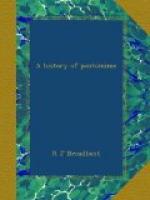“Tell country
players, that old paltry jests
Pronounced
in a painted motley coate,
Filles all the
world so full of cuckoo nests,
That
nightingales can scarcely sing a note.
Oh! bid them turn their minds
to better meanings;
Fields are ill sowne that
give no better gleanings.”
Sir Philip Sidney reprobates the custom of introducing fools on the stage; and declares that the plays of his time were neither right tragedies nor right comedies, for the authors mingled kings and Clowns, “not,” says he, “because the matter so carrieth it, but thrust in the Clowne by head and shoulders to play a part in majestical matters, with neither decencie nor discretion; so as neither the admiration and commisseration, nor the right sportfulnesse, is by their mongrell tragie-comedie obtained.” Rankin, a puritan, contemporary with Shakespeare, wrote a most bitter attack on plays and players, whom he calls monsters; “And whie monsters?” says he, “because under colour of humanitie they present nothing but prodigious vanitie; these are wels without water, dead branches fit for fuell, cockle amongst corne, unwholesome weedes amongst sweete hearbes; and, finallie, feends that are crept into the worlde by stealth, and hold possession by subtill invasion.” In another place, he says, “some transformed themselves to rogues, others to ruffians, some others to Clownes, a fourth to fools; the rogues were ready, the ruffians were rude, theyr Clownes cladde as well with country condition, as in ruffe russet; theyr fooles as fond as might be.”
To give a clear view of our subject, something of the different sorts of fools may be thus classed:
1.—The general domestic fool, termed often, but improperly, a Clown; described by Puttenham as “a buffoune, or counterfett foole.”
2.—The Clown, who was a mere country booby, or a witty rustic.
3.—The female fool, who was generally an idiot.
4.—The city or corporation fool, an assistant in public entertainments.
5.—The tavern fool, retained to amuse the customers.
6.—The fool of the ancient Mysteries and Moralities, otherwise the Vice.
7.—The fool in the old dumb shows, often alluded to by Shakespeare.
8.—The fool in the Whitsun ales and morris dance.
9.—The mountebank’s fool, or merry Andrew.
There may be others in our ancient dramas, of an irregular kind, not reducible to any of these classes; but to exemplify them is not within the scope of this essay: what has been stated may assist the readers of old plays to judge for themselves when they meet with such characters.




